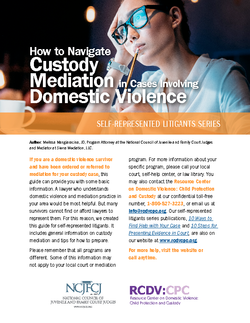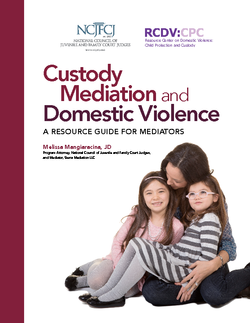Family Law Mediation and Domestic Violence
Melissa Mangiaracina, JD, Program Attorney, National Council of Juvenile and Family Court Judges
Before joining the Resource Center on Domestic Violence: Child Protection and Custody (RCDV:CPC) as a part-time program attorney, I worked for many years as a legal services attorney. I represented children in the custody of social services, immigrant survivors of domestic violence, and victims of elder abuse. I have also had the honor of serving as a justice of the peace pro tempore for many years, where I still occasionally hear and decide cases in a judicial capacity. While both of these roles were invaluable to my current experience with and knowledge of family law and court systems, I often felt that my ability to serve families fully was limited by these traditional court roles. As such, I became a family court mediator and a panelist for court-based custody and dependency mediation programs throughout northern Nevada.
One of the most common forms of alternative dispute resolution, mediation is very different from my previous roles of attorney and judicial officer. As a mediator, I do not advocate for any party’s position. Nor do I make any final decisions about the cases before me. Instead, I bring parents together to help them explore the unique challenges facing their own family unit in a neutral and confidential setting. I strive to help parents meet the needs of their children, informed by their unique experiences and family dynamics. I have seen mediation provide a powerful and positive alternative for parents seeking a more tailored resolution than may be available to them through the court system. At the same time, I have seen mediation present challenges and serious safety concerns for families with histories of intimate partner violence.
Historically, many professionals believed that mediation should never be used in cases involving domestic violence. This position arose in response to family law mediation that routinely failed to screen properly for domestic violence and increased the risk of physical harm to survivors and mediators alike. Even when programs screen for domestic violence, mediators who are not well trained in the dynamics of domestic violence may fail to identify coercive controlling behaviors used by batterers that could impact the parents’ ability to participate in mediation in a meaningful way. In addition, mediators who fail to account for a history of intimidation, bullying, and abuse may allow parties to walk away from mediation with agreements that are unfair or unsafe for the survivor and children.
I agree wholeheartedly with these serious and valid concerns and have seen each of these issues arise in my own cases involving family violence. At the same time, however, it has been my experience that mediation that properly accounts for the abusive nature of the relationship can be incredibly empowering for survivors. If mediation appears appropriate after proper screening, mediation can provide survivors with a less stressful and more affordable option than prolonged court proceedings. When mediators are properly trained in the dynamics of domestic violence and account for the abuse throughout the process, mediation can support survivors as they assert their needs in ways that may not be possible in court. Of course, mediation is not appropriate for all cases involving domestic violence, and there is no bright line rule that can easily be applied for when to proceed with mediation after domestic violence has been identified.
Because I spent the majority of my career working with families experiencing violence, I spent a lot of time as a new mediator searching for information on how best to screen for domestic violence, account for safety when mediating cases involving domestic violence, and otherwise address the concerns noted above. I quickly learned that there is not much readily accessible guidance on this important topic for mediators, advocates, professionals, or survivors.
In September 2018, I paired up with Janice Garceau, Deputy Director of Behavioral Health for Deschutes County, OR, to present a webinar for domestic violence advocates helping survivors prepare for custody mediation. The recorded webinar, entitled “Custody Mediation and Domestic Violence: What Advocates Should Know”, is available at https://www.rcdvcpc.org/resources.html. In addition, the RCDV:CPC supported development of two publications during the past year:
* Within our self-represented litigant series, readers will now find guidance for survivors considering participating in custody mediation in a publication entitled How to Navigate Custody Mediation and Domestic Violence: Self-Represented Litigants Series. This guide is available at https://rcdvcpc.org/resources/resource/how-to-navigate-custody-mediation-in-cases-involving-domestic-violence.html.
* With feedback from professionals at the Association of Family and Conciliation Courts (AFCC), the RCDV:CPC developed and released a resource guide for mediators that contains quick links and references to existing resources that address mediating cases involving domestic violence. The publication, entitled Custody Mediation and Domestic Violence: A Resource Guide for Mediators, is available at https://rcdvcpc.org/resources/resource/custody-mediation-and-domestic-violence-a-resource-guide-for-mediators.html. I invite you to peruse, download, and/or request written copies of any of these documents at your convenience.
In addition to these resources, those of us at the RCDV:CPC are committed to providing ongoing technical assistance and training on mediation in custody or child protection cases involving family violence. If you have a specific need or training request, please do not hesitate to contact us at our confidential toll-free number, 800-527-3223, or email us at info@rcdvcpc.org. We look forward to continuing to provide resources and assistance on this important topic and look forward to hearing about other ways that we can be of assistance in the future.
Download Blog as PDF
One of the most common forms of alternative dispute resolution, mediation is very different from my previous roles of attorney and judicial officer. As a mediator, I do not advocate for any party’s position. Nor do I make any final decisions about the cases before me. Instead, I bring parents together to help them explore the unique challenges facing their own family unit in a neutral and confidential setting. I strive to help parents meet the needs of their children, informed by their unique experiences and family dynamics. I have seen mediation provide a powerful and positive alternative for parents seeking a more tailored resolution than may be available to them through the court system. At the same time, I have seen mediation present challenges and serious safety concerns for families with histories of intimate partner violence.
Historically, many professionals believed that mediation should never be used in cases involving domestic violence. This position arose in response to family law mediation that routinely failed to screen properly for domestic violence and increased the risk of physical harm to survivors and mediators alike. Even when programs screen for domestic violence, mediators who are not well trained in the dynamics of domestic violence may fail to identify coercive controlling behaviors used by batterers that could impact the parents’ ability to participate in mediation in a meaningful way. In addition, mediators who fail to account for a history of intimidation, bullying, and abuse may allow parties to walk away from mediation with agreements that are unfair or unsafe for the survivor and children.
I agree wholeheartedly with these serious and valid concerns and have seen each of these issues arise in my own cases involving family violence. At the same time, however, it has been my experience that mediation that properly accounts for the abusive nature of the relationship can be incredibly empowering for survivors. If mediation appears appropriate after proper screening, mediation can provide survivors with a less stressful and more affordable option than prolonged court proceedings. When mediators are properly trained in the dynamics of domestic violence and account for the abuse throughout the process, mediation can support survivors as they assert their needs in ways that may not be possible in court. Of course, mediation is not appropriate for all cases involving domestic violence, and there is no bright line rule that can easily be applied for when to proceed with mediation after domestic violence has been identified.
Because I spent the majority of my career working with families experiencing violence, I spent a lot of time as a new mediator searching for information on how best to screen for domestic violence, account for safety when mediating cases involving domestic violence, and otherwise address the concerns noted above. I quickly learned that there is not much readily accessible guidance on this important topic for mediators, advocates, professionals, or survivors.
In September 2018, I paired up with Janice Garceau, Deputy Director of Behavioral Health for Deschutes County, OR, to present a webinar for domestic violence advocates helping survivors prepare for custody mediation. The recorded webinar, entitled “Custody Mediation and Domestic Violence: What Advocates Should Know”, is available at https://www.rcdvcpc.org/resources.html. In addition, the RCDV:CPC supported development of two publications during the past year:
* Within our self-represented litigant series, readers will now find guidance for survivors considering participating in custody mediation in a publication entitled How to Navigate Custody Mediation and Domestic Violence: Self-Represented Litigants Series. This guide is available at https://rcdvcpc.org/resources/resource/how-to-navigate-custody-mediation-in-cases-involving-domestic-violence.html.
* With feedback from professionals at the Association of Family and Conciliation Courts (AFCC), the RCDV:CPC developed and released a resource guide for mediators that contains quick links and references to existing resources that address mediating cases involving domestic violence. The publication, entitled Custody Mediation and Domestic Violence: A Resource Guide for Mediators, is available at https://rcdvcpc.org/resources/resource/custody-mediation-and-domestic-violence-a-resource-guide-for-mediators.html. I invite you to peruse, download, and/or request written copies of any of these documents at your convenience.
In addition to these resources, those of us at the RCDV:CPC are committed to providing ongoing technical assistance and training on mediation in custody or child protection cases involving family violence. If you have a specific need or training request, please do not hesitate to contact us at our confidential toll-free number, 800-527-3223, or email us at info@rcdvcpc.org. We look forward to continuing to provide resources and assistance on this important topic and look forward to hearing about other ways that we can be of assistance in the future.
Download Blog as PDF



